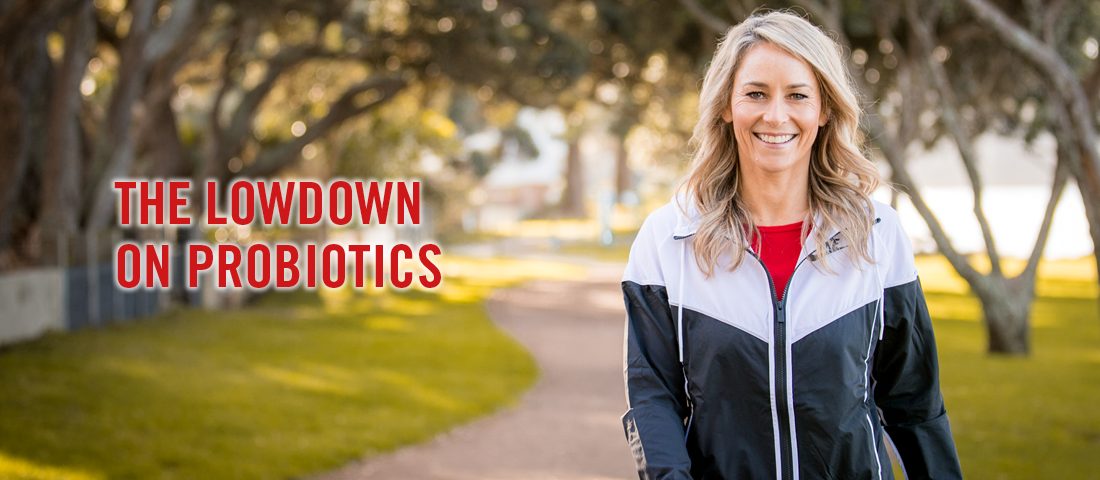
How to look after your Gut Health – How Digestive Enzymes can help
September 5, 2018
Gut Feeling: Understanding the Role of Prebiotics vs. Probiotics
June 20, 2019How to look after your Gut Health – The Lowdown on Probiotics

So far in this “Looking after your Gut Health” series, we’ve talked about:
- The bare-bones basics of supporting your digestive health
- Herbs and nutrients that can help
- The importance of digestive enzymes
And now, let’s talk probiotics …
A probiotic primer: what are they, and what do they actually DO?
You’ve probably heard the term “probiotic” before – perhaps as an ingredient in yoghurt, kefir or kombucha. If so, you probably know that probiotics are good for you… but you might feel a little fuzzy on exactly WHY.

Probiotics go by several different names: gut flora, probiotic bacteria or beneficial bacteria just for starters. Regardless of what you call them, literally billions of them, from over 400 different species live in a healthy human digestive system. And just some of the benefits they pay as “rent” for their living space include:
- Generally supporting health and wellbeing: research has shown that probiotic bacteria can support digestive health in several ways. And as we talked about back in Article #1, a healthy digestive system plays a role in immunity and general wellness.
- Competing with less friendly organisms in your gut: there are a vast number of non-probiotic bacteria competing with beneficial bacteria in your body. Probiotics support the normal balance of bacteria in your gut & the restoration of balance following the disruption caused by antibiotic use.
- Helping to maintain the right pH: one family of natural gut bacteria, Lactobacillus, produces lactic acid. This compound helps to keep environmental conditions in your digestive system less welcoming for non-probiotic bacteria and other unhelpful microbes.
- Producing important nutrients: some probiotic strains actually produce essential B-group vitamins that your body can absorb and use. These B-vitamins play a role in creating cellular energy, processing other nutrients, and helping to maintain immunity.
Are all probiotics the same?
With the way supplements and health foods are marketed, it’s easy to think of “probiotics” as a single ingredient. In reality, however, the term is a bit like “herbs” or “nutrients” – there’s a wide range of different types, and each one does something different in our bodies.
So before you assume that “a probiotic is a probiotic is a probiotic” and just reach for whatever happens to be on sale that day, here are a few things to consider:
- First, not all probiotic bacteria strains have been researched – and for those that have, different effects have been noted. That means that if you’re looking for a specific effect from your probiotic (e.g. supporting immunity, digestive health, kids’ skin health or even urinary tract health), you want a product containing at least one specific strain that’s researched to have that effect.
- Second, unlike other herbs or nutrients, probiotics need to actually be alive when you take them to have an effect. That might not sound like a problem… until you realise just how fragile most probiotic organisms are. Temperature and humidity changes can easily kill many strains in the capsule before you even swallow them.
- Third, not all probiotics are viable all the way to their site of action. Many people believe they can get all the probiotics they need from their food. But bacteria that are comfortable in the cool, creamy environment of yoghurt or kefir drink may not survive a trip through the harsh acidity and heat of your stomach.
Probiotic options for the whole family…
Just like enzymes, you are able to provide your body with a top-up of probiotics in a couple of ways, through your diet, and with supplementation.
There are a variety of food sources that contain probiotics and if you’ve ever stood in front of a pharmacy shelf, you’ll know there are a huge range of supplements available too.
Bearing the 3 points of difference in probiotics (above) in mind, talk to your pharmacist or health professional about which option will be best for you. This will depend on what your gut health is currently like and what you’re hoping to support by taking a probiotic.
Thanks for reading our four-part series on how looking after your gut health works. Get in touch with us on social media if you’d like us to do a series on another particular topic!




